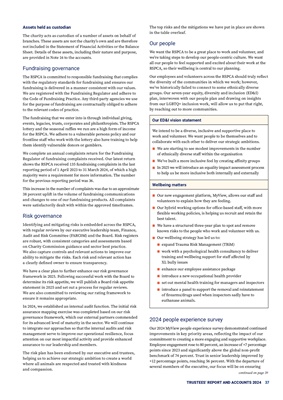
TRUSTEES' REPORT AND ACCOUNTS 2024 37
Assets held as custodian
The charity acts as custodian of a number of assets on behalf of
branches. These assets are not the charity's own and are therefore
not included in the Statement of Financial Activities or the Balance
Sheet. Details of these assets, including their nature and purpose,
are provided in Note 16 to the accounts.
Fundraising governance
The RSPCA is committed to responsible fundraising that complies
with the regulatory standards for fundraising and ensures our
fundraising is delivered in a manner consistent with our values.
We are registered with the Fundraising Regulator and adhere to
the Code of Fundraising Practice. Any third-party agencies we use
for the purpose of fundraising are contractually obliged to adhere
to the relevant codes of practice.
The fundraising that we enter into is through individual giving,
events, legacies, trusts, corporates and philanthropists. The RSPCA
lottery and the seasonal raffles we run are a high form of income
for the RSPCA. We adhere to a vulnerable persons policy and our
frontline staff who work with the lottery also have training to help
them identify vulnerable donors or gamblers.
We complete an annual complaints return for the Fundraising
Regulator of fundraising complaints received. Our latest return
shows the RSPCA received 135 fundraising complaints in the last
reporting period of 1 April 2023 to 31 March 2024, of which a high
majority were a requirement for more information. The number
for the previous reporting period was 36.
This increase in the number of complaints was due to an approximate
38 percent uplift in the volume of fundraising communications
and changes to one of our fundraising products. All complaints
were satisfactorily dealt with within the approved timeframes.
Risk governance
Identifying and mitigating risks is embedded across the RSPCA,
with regular reviews by our executive leadership team, Finance,
Audit and Risk Committee (FARC0M) and the Board. Risk registers
are robust, with consistent categories and assessments based
on Charity Commission guidance and sector best practice.
We also capture controls and relevant actions to improve our
ability to mitigate the risks. Each risk and relevant action has
a clearly defined owner to ensure transparency.
We have a clear plan to further enhance our risk governance
framework in 2025. Following successful work with the Board to
determine its risk appetite, we will publish a Board risk appetite
statement in 2025 and set out a process for regular reviews.
We are also committed to reviewing our rating framework to
ensure it remains appropriate.
In 2024, we established an internal audit function. The initial risk
assurance mapping exercise was completed based on our risk
governance framework, which our external partners commended
for its advanced level of maturity in the sector. We will continue
to integrate our approaches so that the internal audits and risk
management serve to improve our operational resilience, focus
attention on our most impactful activity and provide enhanced
assurance to our leadership and members.
The risk plan has been endorsed by our executive and trustees,
helping us to achieve our strategic ambition to create a world
where all animals are respected and treated with kindness
and compassion.
The top risks and the mitigations we have put in place are shown
in the table overleaf.
Our people
We want the RSPCA to be a great place to work and volunteer, and
we're taking steps to develop our people-centric culture. We want
all our people to feel supported and excited about their work at the
RSPCA, so their wellbeing is central to our planning.
Our employees and volunteers across the RSPCA should truly reflect
the diversity of the communities in which we work; however,
we've historically failed to connect to some ethnically diverse
groups. Our seven-year equity, diversity and inclusion (ED&I)
plan, interwoven with our people plan and drawing on insights
from our LGBTQ+ inclusion work, will allow us to put that right,
by reaching out to more communities.
Our ED&I vision statement
We intend to be a diverse, inclusive and supportive place to
work and volunteer. We want people to be themselves and to
collaborate with each other to deliver our strategic ambitions.
• We are starting to see modest improvements in the number
of ethnically diverse staff within the organisation
• We've built a more inclusive feel by creating affinity groups
• In 2025 we will introduce an equality impact assessment process
to help us be more inclusive both internally and externally
Wellbeing matters
• Our new engagement platform, MyView, allows our staff and
volunteers to explain how they are feeling.
• Our hybrid working options for office-based staff, with more
flexible working policies, is helping us recruit and retain the
best talent.
• We have a structured three-year plan to spot and remove
known risks to the people who work and volunteer with us.
• Our wellbeing strategy has led us to:
• expand Trauma Risk Management (TRiM)
• work with a psychological health consultancy to deliver
training and wellbeing support for staff affected by
XL bully issues
• enhance our employee assistance package
• introduce a new occupational health provider
• set out mental health training for managers and inspectors
• introduce a panel to support the removal and reinstatement
of firearms/drugs used when inspectors sadly have to
euthanase animals.
2024 people experience survey
Our 2024 MyView people experience survey demonstrated continued
improvements in key priority areas, reflecting the impact of our
commitment to creating a more engaging and supportive workplace.
Employee engagement rose to 80 percent, an increase of +7 percentage
points since 2023 and significantly above the global non-profit
benchmark of 74 percent. Trust in senior leadership improved by
+12 percentage points, reaching 56 percent. With the departure of
several members of the executive, our focus will be on ensuring
continued on page 39